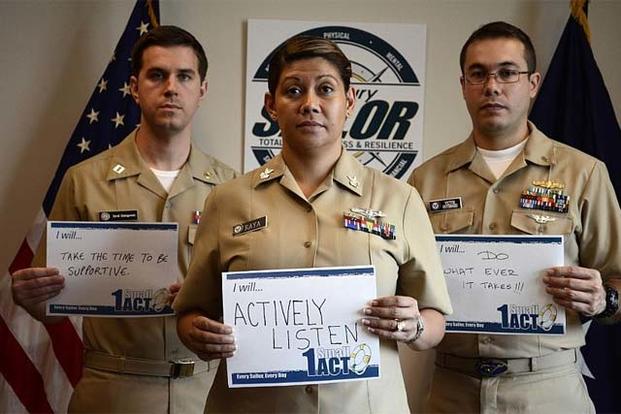A Navy program rolling out in the coming year aims to keep care providers in closer contact with sailors who have expressed suicidal ideations in an effort to prevent suicide in the ranks.
Called Sailor Assistance and Intercept for Life, or SAIL, the program is modeled after a Marine Corps initiative launched in late 2013.
Both SAIL and the Marine Intercept Program allow counselors to make contact with consenting troops at six different intervals -- 3, 7, 14, 30, 60 and 90 days -- after a service member expresses a suicidal ideation.
"We need to develop a culture where people are just not afraid to ask for help when facing a challenge that is just a little overwhelming," Capt. Mike Fisher, director of the Navy's Suicide Prevention Branch, told Military.com in an interview. "This is just one more small act that can save one more life."
The SAIL program, which will be in addition to, not replacing, existing prevention programs, launched in the Navy's Pacific Northwest region in late August in what will be a phased rollout ending in the third quarter of Fiscal 2017.
Fisher said the program will require little additional work and staffing; only discreet communication between the Navy's Fleet and Family Support Program and regional caseworkers who will stay in contact with the at-risk sailor. The phone check-ins will be simple and informal, Fisher said, and caseworkers will not provide therapy during the calls.
The Navy is launching SAIL as the Marine Intercept Program marks early successes.
In March, Lt. Gen. Mark Brilakis, deputy commandant for Marine Corps Manpower and Reserve Affairs, told a congressional panel that 77 percent of Marines who reported suicidal ideations or attempts accepted the program's services in 2015. A preliminary review of 2014 data showed that Marines in the program accessed care 2.5 times sooner, engaged with specialty care more frequently, and missed fewer appointments, he said.
In a Navy administrative message released Thursday announcing the program, officials at Naval Personnel Command noted it was important to have a system in place to reach out to at-risk sailors because they often struggled to seek help on their own.
"Suicide prevention requires ongoing efforts to promote health and a sense of community. It is a shared responsibility," the message states. "Despite the fact that 85 percent of Sailors say they will seek help if overwhelmed by stress, 2 out of 3 believe there are barriers to seeking help, and 1 in 3 believe their shipmates will see them as weak."
Fisher said officials would periodically evaluate the success of the program and determine if more resources are needed to execute it.
"Can we handle it? The perception is yes," he said.
-- Hope Hodge Seck can be reached at hope.seck@military.com. Follow her on Twitter at@HopeSeck.





























